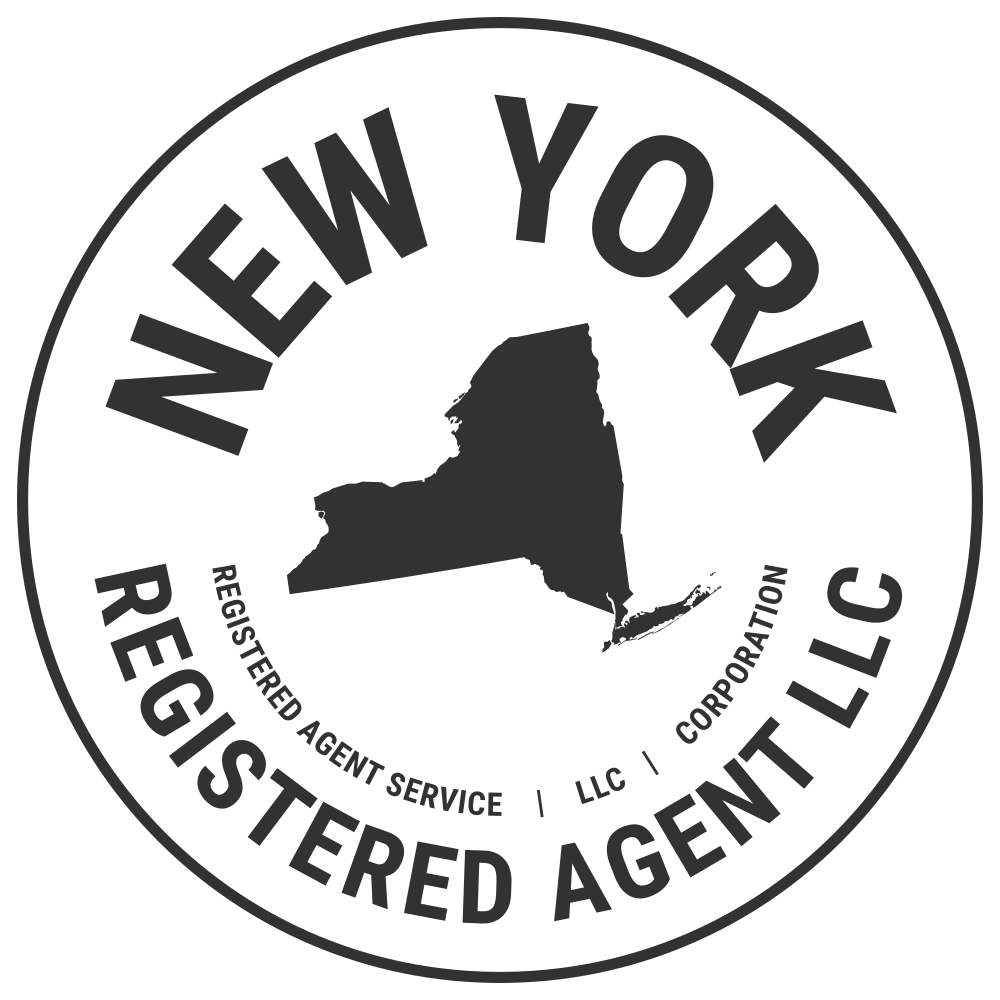New York Corporate Bylaws
Get Started on Your Bylaws
| With the FREE, attorney-drafted corporate bylaws template provided below.
Or, hire us to serve as your registered agent or form your corporation, and you’ll get access to our complete library of business documents. |
 |
Corporate Bylaws: What Are They?
New York corporate bylaws are the central governing document of your corporation. An internal document, corporate bylaws lay out the rules for how your corporation operates, including the decision-making process and the rights and responsibilities of shareholders, officers, and directors. You can think of corporate bylaws as the blueprint for running your company. Like a contract, corporate bylaws are legally binding.
Corporate bylaws are required by state law in New York, but you don’t need to file your bylaws with the NY Department of State. The law stipulates that your bylaws must be adopted by your incorporators during your company’s initial organization meeting. However, you can change or update your bylaws as needed, provided that you follow the correct procedures.
Here’s what you’ll find on this page:
FREE New York Bylaws Template
Why Corporate Bylaws Are Important
What to Include in Your Bylaws
New York Corporate Bylaws FAQs
FREE New York Bylaws Template
Start drafting your New York corporate bylaws now using our FREE template, drafted by one of our lawyers. You can customize the template to meet the distinct needs of your company.
If you’re ready to start but not prepared to finish your bylaws all in one sitting, you can save your progress and return at your convenience. Download and print out your completed bylaws when you’re done.
Why Corporate Bylaws Are Important
To start, state statue NY Bus Corp L § 601 requires that all New York corporations adopt bylaws during the initial organization meeting. So if you don’t have bylaws, your corporation is in violation of the law. Your incorporators are responsible for preparing and adopting your bylaws.
Beyond that, bylaws are essential for making sure your business remains well-organized and running smoothly. Additionally, bylaws help protect your company’s assets and the rights of your shareholders, officers, and directors. It’s also possible that you’ll need to provide copy of your bylaws in situations like applying for loans, when making appeals to investors, or renting property.
Keep business running as usual
Strong bylaws clearly establish your corporation’s rules and regulations and the protocols for ensuring that those in charge of managing your corporation adhere to those rules.
Having procedures in place will minimize confusion in moments where you need to act quickly to avoid a crisis or take advantage of an opportunity. Bylaws also help to make sure your board maintains transparency for shareholders and is consistent in its decision-making.
Get ahead of potential conflicts
With so many players involved—shareholders, officers, directors, and possibly additional managers—disagreements and other conflicts are more likely to occur. However, if you have rules in place for how to deal with disputes and conflicts of interest, you should be able to handle them with minimal fuss.
With strong bylaws, you won’t need to waste time figuring our how to deal with a dispute because the path for resolution is laid out for you.
Protect your business in court
On the off chance you end up in court, having robust bylaws can help maintain the rights and assets of your shareholders.
Bylaws provide proof of shareholders’ ownership and ownership percentage and of the legal separation between your shareholders and the corporation itself (also referred to as limited liability). Bylaws also serve as verification of the responsibilities of your company’s management team. Basically, your bylaws allow you to keep your bases covered.
Hire Us to Get More Benefits
Order Registered Agent or Company Formation Service & take advantage of all we have to offer:
-
- Save HUNDREDS compared to national companies
-
- FREE business address
-
- FREE limited mail forwarding
-
- Access to our library of FREE New York business documents
-
- Secure online account
-
- Timely notifications
-
- Annual report reminders
-
- 90-Day FREE trial of website & phone service
-
- Expert support from our New York filing specialists
Plus, when you order Company Formation, we file your formation paperwork and handle any publication requirements!
What to Include in Your Bylaws
Truthfully, there aren’t any requirements for what you need to include in your bylaws. That said, most bylaws include a common set of provisions regarding the company’s structure, management, and ownership, along with rules for amending the bylaws or making big changes (for example, merging with another company or replacing a board member).
It’s a good idea to have your bylaws reviewed by a lawyer if they get complicated or you want to add special provisions.
Your bylaws can include any provisions you’d like as long as they don’t conflict with your Certificate of Incorporation or New York state law. For example, you can’t write into your bylaws that your corporation isn’t required to have a registered agent because having a registered agent is required NY state statutes.
Here are the basic sections covered in most bylaws:
This includes:
- Company name and address
- Name and address of your New York registered agent
- Your jurisdiction of formation
- Your company purpose
You’ll want to list the following information:
- Shareholder names and addresses
- The contribution(s) each shareholder made to become a shareholder. Usually, this is a dollar amount, but it could also be labor, time, or intellectual property
- How these contributions convert into shares (this is especially important for non-monetary contributions)
Typically, your management team is comprised of your company’s officers—the CEO, the CFO, the COO, and so on—while the actions of your officers are overseen by your board of directors.
Your board of directors is the governing body of your corporation, tasked with steering the direction of the company and protecting shareholder interests. Your corporation’s board of directors may start out as the group of people who form your corporation. As your company grows, your shareholders can vote to elect and replace board members.
You need to include the following about your board and its duties:
- Names and addresses
- Meeting schedule and regulations
- Voting rights and procedures
Your board appoints your officers to manage the business.
Here’s what your bylaws should contain about your officers:
- Title and role of each officer (Chief Executive Officer, Vice President, Secretary, Chief Financial Officer, Chief Legal Officer, and so on)
- Officer duties and obligations
Additionally, you’ll need to address leadership transitions—how to handle replacing directors and officers who are fired or leave the company. You might also include procedures for how to forcibly remove a board member.
Your bylaws should explain who can purchase stock and how. Initially, your corporation will be privately traded, but you’ll need to update this section if you decide to go public at a later date.
Generally, here’s what to include:
- Classes of stock (common versus preferred) and rights of each class
- Shareholder meeting schedule and regulations
- Shareholder voting rights and procedures
In this section, you can lay out any important rules for bookkeeping, identify your tax classification, and keep track of your company’s assets. For example, you may list your corporation’s bank accounts, property, and vehicles.
In case of disagreements or conflicts of interest, you need to have procedures for resolving internal disputes in place. This can prevent you from ending up in court and help protect the rights of everyone involved in the dispute.
Your bylaws are legally binding, but that doesn’t mean they can’t be changed. You can update, add, or even revoke portions of your bylaws, and it’s much easier if you’ve clearly laid out how to do so beforehand. For example, how many votes are needed to approve an amendment? Do shareholders have to vote in-person or can you hold a virtual meeting?
While you might not entertain the possibility of dissolution or merger now, having rules in place that explain the requirements for dissolution or merger. For example, specific events like filing for bankruptcy or failure to maintain your company’s good standing with the state could trigger dissolution. In the case of either dissolution or merger, you’ll want to describe how shares and other assets will be transferred or distributed among shareholders.
New York Corporate Bylaws FAQs
Yes. Having corporate bylaws is required by state law in New York.
Your bylaws should be adopted during your corporation’s organizational meeting by your incorporators. Your bylaws may be written by a lawyer or a member of your company who is well-versed in how corporate bylaws work. You can also use a template to write your bylaws, such as our free, attorney-drafted New York corporate bylaws template.
Yes. If are familiar with drafting bylaws or use a template, you can write your own bylaws. You may still want to have your bylaws reviewed by a lawyer.
No. Your bylaws are an internal document.
If you are a shareholder or on the board of directors, yes. However, because your bylaws are internal document, this information is not public.
Yes. Corporate bylaws are legally binding. Typically, bylaws are signed by at least the director of the board, but your bylaws can be valid even if they aren’t signed.
Yes. You can amend your bylaws, but make sure you follow the proper procedures. When drafting your bylaws, include a provision that explains the rules for making changes or adding amendments.
If your bylaws happen to be destroyed or misplaced, you’ll need to replace them as soon as possible. To try and prevent this from occurring, it might a good idea to store an additional copy of your bylaws with your lawyer, in a safety deposit box, or with a member of the board of directors.
Should you be required to replace your bylaws, one thing you can do is refer to the minutes from your organizational meeting (if you still have them) and use these notes to reconstruct your bylaws. You may also enlist an attorney to assist you, depending on how complex your original bylaws were and how many shareholders you have. Of course, your new bylaws will need to be approved and adopted by your board, just like the original bylaws.

